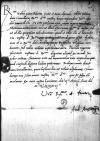List #1426
Andrzej KRZYCKI (CRICIUS) do Ioannes DANTISCUSŁowicz, 1536-03-06
| odebrano [1536]-03-19 Rękopiśmienne podstawy źródłowe:
Pomocnicze podstawy źródłowe:
Publikacje:
| ||||||||||
Tekst + aparat krytyczny + komentarzZwykły tekstTekst + komentarzTekst + aparat krytyczny
Reverendissimo in Christo Patri et domino
Reverendissime in Christo Pater et domine, frater et amice observan(de) or observan(dissime)⌈observan(de)observan(de) or observan(dissime)⌉.
Obliti fuimus dare
Reliqua omnia dicet eius
Commendamus nos solito amori Vestrae Reverendissimae Dominationis. Quae sit felix et incolumis.
Ex
Vestrae Reverendissimae Dominationis frater


 BCz, 247, p. 268
BCz, 247, p. 268